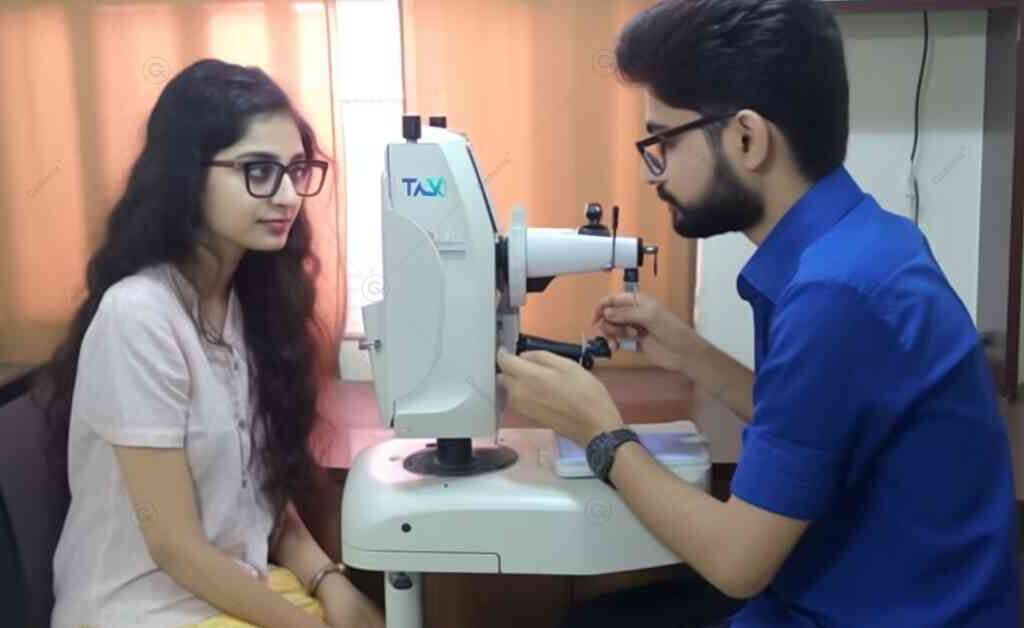Refractometry is a vital technique used in optometry to measure the refractive error of the eye, which helps determine the appropriate prescription for eyeglasses or contact lenses. This article explores the significance of refractometry, the instruments used, and its impact on optometric practice.
Keywords: refractometry, optometry, eye measurement, refractive error, optometric instruments, eyeglass prescription, contact lens prescription.
Understanding Refractometry
Refractometry is the measurement of how light bends as it passes through different mediums, particularly the eye. In optometry, this technique is used to assess the refractive error of a patient’s eyes, which includes myopia (nearsightedness), hyperopia (farsightedness), astigmatism, and presbyopia. By accurately measuring these errors, optometrists can prescribe corrective lenses that improve the patient’s vision.
The process involves using a refractometer or phoropter, devices designed to measure the eye’s refractive power. These instruments evaluate how light is focused on the retina, determining the lens power needed to correct vision.
Refractometer Instruments Used in Industry
Several refractometer instruments are integral to the practice in optometry. The most commonly used devices include:
Phoropter
A phoropter is a comprehensive device that allows optometrists to test various lens prescriptions by placing different lenses in front of the patient’s eyes. This instrument helps determine the precise lens power required to correct refractive errors. The phoropter consists of multiple lenses and prisms, enabling detailed and accurate measurements.
Autorefractor
An autorefractor is an automated device that quickly measures refractive error. It provides an initial prescription by analyzing how light reflects off the retina. While not as detailed as a phoropter, the autorefractor is valuable for providing a baseline measurement, especially useful for non-cooperative patients or children.
Keratometer
A keratometer measures the curvature of the cornea, essential for diagnosing astigmatism. By understanding the cornea’s shape, optometrists can determine the necessary corrections to achieve clear vision. This device is also crucial in fitting contact lenses, ensuring a comfortable and effective fit.
For more information on instruments, visit Topcon Healthcare and Zeiss Medical Technology.
Importance of Refractometers in Optometry
Refractometry plays a crucial role in optometry, ensuring that patients receive accurate and effective vision correction. By determining the precise refractive error, optometrists can provide customized prescriptions for eyeglasses and contact lenses. This not only improves visual acuity but also enhances overall quality of life for patients.
Accurate refractometry is essential for diagnosing and managing various eye conditions. Regular eye exams incorporating refractometry help detect early signs of vision problems, allowing for timely intervention and treatment. For patients with conditions like keratoconus or after refractive surgery, detailed refractometry is critical for monitoring changes and adjusting prescriptions accordingly.
Moreover, advancements in technology have streamlined the examination process, making it more efficient and comfortable for patients. Modern instruments provide quick and precise measurements, reducing the time spent on testing and improving the patient experience.
Careers in Refractometry and Optometry
For those interested in pursuing a career in optometry, proficiency in this field is essential. Optometrists must be skilled in using various instruments to perform accurate eye exams and prescribe appropriate corrective lenses. This expertise ensures that patients receive the best possible care for their vision needs.
Optometrists typically undergo extensive education and training, including a Doctor of Optometry (OD) degree, which covers refractometry and other essential optometric practices. Continuing education is also vital, as it allows optometrists to stay updated on the latest advancements in optometric technology.
Career opportunities for optometrists are diverse, ranging from private practice to working in healthcare institutions, research, and academia. With the growing demand for eye care services, the field of optometry offers a promising and rewarding career path.

Future Trends
The future of refractometry in optometry looks promising, with ongoing advancements in technology and methods. Innovations such as wavefront aberrometry and adaptive optics are enhancing the accuracy and precision of refractive measurements. These technologies analyze the eye’s optical system in greater detail, providing more comprehensive data for customized vision correction.
Tele-optometry is another emerging trend, allowing optometrists to conduct refractometry exams remotely. This approach expands access to eye care, especially in underserved areas, and provides convenience for patients.
Additionally, the integration of artificial intelligence (AI) in refractometry is revolutionizing the field. AI-powered devices can analyze vast amounts of data quickly, offering highly accurate measurements and predictive insights for personalized eye care.
For more insights into the future of refractometry, visit American Optometric Association and Optometric Management.
Essential Skills for Optometrists in Refractometry
Refractometry is a critical aspect of optometric practice, requiring a set of specialized skills to ensure accurate diagnosis and effective patient care. Optometrists must be proficient in using various refractometry instruments, such as phoropters, autorefractors, and keratometers. This involves not only technical know-how but also the ability to interpret measurements accurately to diagnose refractive errors and prescribe corrective lenses.
Technical Proficiency
Optometrists need to be adept at operating devices. This includes understanding the mechanics of phoropters and autorefractors, calibrating the equipment, and troubleshooting any technical issues that may arise during an examination. Familiarity with newer technologies like wavefront aberrometers can also be beneficial as these tools provide more detailed refractive data.
Diagnostic Interpretation
Beyond technical skills, optometrists must be skilled in interpreting the data obtained from refractometry. This involves analyzing measurements of myopia, hyperopia, astigmatism, and presbyopia to determine the appropriate corrective measures. Accurate interpretation is crucial for prescribing the correct eyeglasses or contact lenses, ensuring that patients achieve optimal visual acuity.
Patient Interaction and Communication
Effective communication skills are essential for optometrists, as they need to explain the refractometry process and results to patients clearly. This includes discussing the implications of refractive errors, the benefits of different corrective options, and addressing any concerns patients might have. Building a rapport with patients can enhance their comfort and cooperation during eye exams.
Leading Companies in Refractometry Instruments
Several key players in the field of refractometry manufacture advanced instruments that are integral to modern optometric practice. These companies are renowned for their innovation, quality, and contributions to eye care technology.
Topcon Corporation
Topcon Corporation is a global leader in the field of ophthalmic equipment. They produce a wide range of refractometry instruments, including autorefractors, keratometers, and combination devices that offer comprehensive eye examinations. Topcon’s commitment to innovation and quality makes them a trusted name in optometry.
Carl Zeiss Meditec AG
Carl Zeiss Meditec AG is another prominent player in the refractometry market. Known for their precision optics, Zeiss offers state-of-the-art refractometry equipment that provides highly accurate measurements. Their products are widely used in both clinical and research settings, making significant contributions to the advancement of eye care.

NIDEK Co., Ltd.
NIDEK is a leading manufacturer of diagnostic equipment for ophthalmology and optometry. Their refractometry devices are known for their reliability and accuracy. NIDEK’s continuous innovation and focus on user-friendly technology have made their instruments a staple in optometric practices worldwide.
Canon Medical Systems
Canon Medical Systems, formerly known as Canon USA, produces a variety of advanced medical devices, including refractometers. Their technology integrates imaging and diagnostic capabilities, providing comprehensive tools for eye care professionals. Canon’s reputation for high-quality imaging equipment extends to their refractometry instruments.
For more information on these companies and their contributions to refractometry, visit Topcon Healthcare, Zeiss Medical Technology, NIDEK, and Canon Medical Systems.
Services for Job Seekers in Refractometry
For job seekers specializing in refractometry, presenting technical skills and experience effectively is crucial. We provide tailored services to enhance your employability and help you stand out to potential employers.
Skill Development and Presentation
Our services include training in the latest refractometry technologies and best practices, ensuring you stay updated with industry advancements. We also offer workshops on how to effectively present your technical expertise in refractometry to employers. This includes crafting compelling resumes, preparing for technical interviews, and showcasing practical experience with refractometry instruments like phoropters, autorefractors, and keratometers.
Networking and Mentorship
We facilitate networking opportunities with industry professionals and mentors. These connections can provide valuable insights into the job market, help you understand employer expectations, and offer guidance on career development. Our mentorship programs pair you with experienced optometrists and industry experts who can provide personalized advice and support.
Consulting Services for Optometrists and Small Businesses
Whether you are an optometrist seeking a job or a small business in the field of optometry, our consulting services are designed to meet your needs.
Consulting for Optometrists
For newly graduated optometrists, we offer career consulting sessions that include resume reviews, interview coaching, and job search strategies. Our experts can help you identify opportunities that align with your skills in refractometry and other areas of optometry. We also provide advice on continuing education and certification programs to enhance your qualifications.
Business Services for Optometry Practices
For small businesses, we provide consulting services to optimize your practice operations. This includes guidance on selecting and implementing refractometry instruments, training staff, and improving patient care workflows. Our consultants can help you develop business strategies, marketing plans, and financial management practices to ensure the success and growth of your optometry practice.
To learn more about our services and schedule a consulting session, please visit our website or contact us directly.
Conclusion
Refractometry is a cornerstone of optometric practice, essential for diagnosing and correcting refractive errors. The use of advanced instruments like phoropters, autorefractors, and keratometers ensures accurate and effective vision correction for patients. As technology continues to evolve, refractometry will play an increasingly important role in enhancing eye care and improving patient outcomes.
Relevant Key Phrases and Keywords: refractometry, optometry, eye measurement, refractive error, optometric instruments, eyeglass prescription, contact lens prescription, phoropter, autorefractor, keratometer, AI in optometry, tele-optometry.
For more detailed information, visit the American Academy of Optometry and National Eye Institute.

